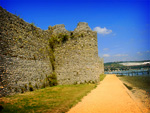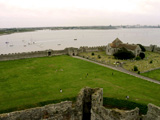Arrival of the Anglo-Saxons
Background to the Anglo Saxons
 The power vortex created by the Roman withdrawal from Britain, in the early part of the fifth century AD, left a place ideal for colonisation by aggressive warrior nations. It certainly was an opportunity that the Angles, Saxons and Danes were not going to pass up! By the sixth century AD, they had landed in Britain, forever changing the political landscape there.
The power vortex created by the Roman withdrawal from Britain, in the early part of the fifth century AD, left a place ideal for colonisation by aggressive warrior nations. It certainly was an opportunity that the Angles, Saxons and Danes were not going to pass up! By the sixth century AD, they had landed in Britain, forever changing the political landscape there.
 The lack of written records, and general Roman disinterest in the province, makes accurate accounting of the Saxon occupation difficult. The hardest time is probably the period from the Roman withdrawal in AD410 to the time of Bede at the end of the seventh century AD. Before their conversion to Christianity the Saxons kept no written records, and even the Anglo Saxon chronicles, while very useful, are probably very biased sources writing gossip after the fact.
The lack of written records, and general Roman disinterest in the province, makes accurate accounting of the Saxon occupation difficult. The hardest time is probably the period from the Roman withdrawal in AD410 to the time of Bede at the end of the seventh century AD. Before their conversion to Christianity the Saxons kept no written records, and even the Anglo Saxon chronicles, while very useful, are probably very biased sources writing gossip after the fact.
 To further complicate matters, we are looking at a people from the "modern" perspective. What we now refer to as the "Anglo-Saxons" would probably be as meaningless to them as calling the Celts, celts. While the Germanic tribes which came to Britain in the fifth century AD had lots in common, they were still numerous tribes. The "Saxons" were the most dominant - however the "Angles" were the ones whom the country became named after. In addition Jutes came over, settling mostly along the south coast, and some sources indicate Franks were amongst the settlers in Kent.
To further complicate matters, we are looking at a people from the "modern" perspective. What we now refer to as the "Anglo-Saxons" would probably be as meaningless to them as calling the Celts, celts. While the Germanic tribes which came to Britain in the fifth century AD had lots in common, they were still numerous tribes. The "Saxons" were the most dominant - however the "Angles" were the ones whom the country became named after. In addition Jutes came over, settling mostly along the south coast, and some sources indicate Franks were amongst the settlers in Kent.
For the purposes of this article, the term Saxons will be used to mean any and all of the Germanic tribes that came to settle in Britain in the centuries after the Romans left.
The Saxons Arrive
Sources such as Gildas, place the arrival of the Saxons around AD449 (note: This is about 100 years before Gildas's time). A devout British Christian (also called Celtic Christian, although this is less accurate), most of Gildas' work was lamenting how the leaders of Britain had strayed from the path of righteousness and the Saxons were visited upon the British as God's punishment - a similar story to the Saxon Bede as he chronicled the Viking raids.
To be continued...